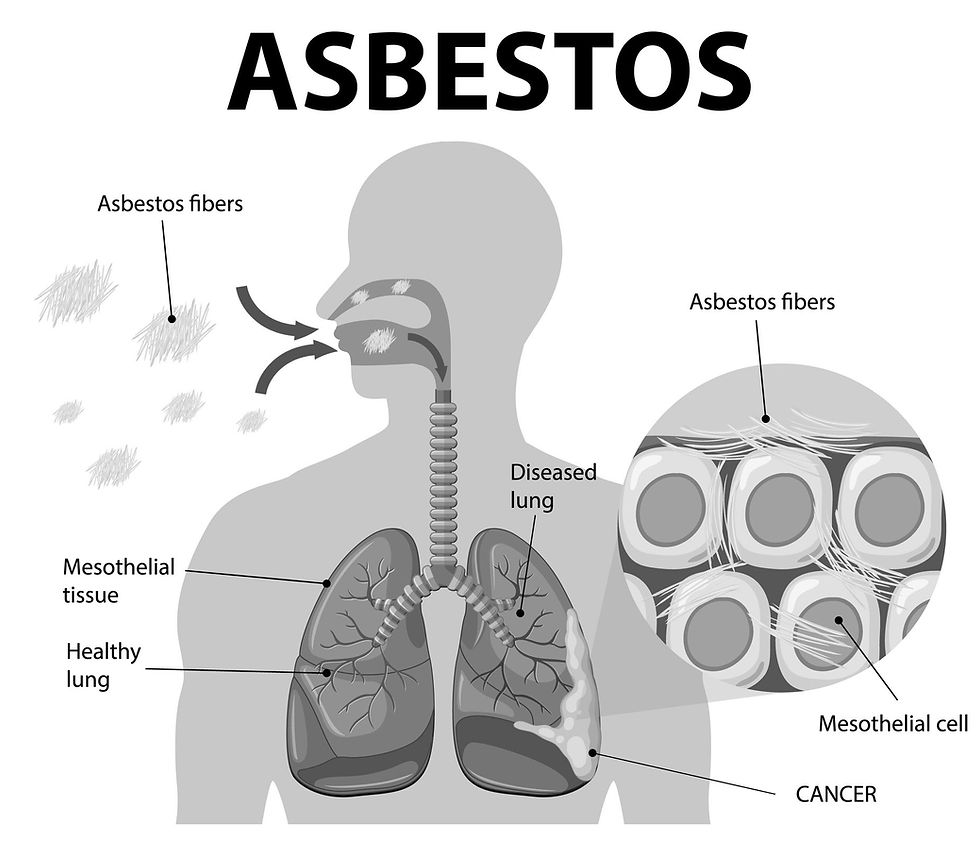Asbestos Related Diseases: Types, Symptoms, How They Progress and What You Can Do If You Have Been Diagnosed
- C. Roberts
- Jun 30, 2025
- 3 min read
Learn how asbestos exposure can lead to serious conditions—including asbestosis, lung cancer, and mesothelioma. Recognizing early signs can make a difference.

Asbestos is a naturally occurring mineral once widely used in construction, shipbuilding, and industrial materials for its heat resistance and durability. When inhaled, asbestos fibers can become lodged deep in the lungs or abdominal lining, causing long-term damage that often takes decades to appear.
Over time, asbestos exposure may lead to:
Asbestosis – scarring of lung tissue that reduces breathing capacity
Lung cancer – particularly in individuals who also smoke
Mesothelioma – a rare, aggressive cancer caused exclusively by asbestos exposure
Types of Mesothelioma (and How It Affects the Body)
Mesothelioma forms in the mesothelium, a thin lining that surrounds certain organs. The type of mesothelioma depends on where it occurs:
Pleural mesothelioma – develops in the lining of the lungs (pleura); most common form
Peritoneal mesothelioma – forms in the abdominal lining (peritoneum); second most common
Pericardial mesothelioma – rare; affects the heart lining
Testicular mesothelioma – extremely rare; occurs in the lining of the testes
Because pleural and peritoneal mesothelioma both originate in areas critical to breathing or digestion, they may cause very different symptoms—but both are serious and often progress quickly if left undiagnosed.
Common Symptoms of Asbestos-Related Diseases
Asbestos-related conditions often take 10–40 years to surface. Symptoms vary depending on the specific disease but tend to worsen over time.
Watch for the following signs:
Shortness of breath (asbestosis, pleural mesothelioma, lung cancer)
Chronic, dry cough (asbestosis, pleural mesothelioma, lung cancer)
Chest pain or tightness (pleural mesothelioma, lung cancer)
Fatigue or weakness (all types)
Unexplained weight loss (pleural & peritoneal mesothelioma, lung cancer)
Swelling or pain in the abdomen (peritoneal mesothelioma)
Changes in bowel habits or appetite (peritoneal mesothelioma)
Fever or night sweats (pleural mesothelioma, peritoneal mesothelioma)
Clubbing of the fingers (asbestosis, pleural mesothelioma)
If you have a known history of asbestos exposure and are experiencing any of these symptoms, talk to your doctor about screening options.
Disease Progression: From Exposure to Diagnosis

1. Initial Exposure
Asbestos fibers are inhaled or ingested, often unknowingly, during work or military service.
2. Latency Period
The fibers remain in the body for decades, slowly causing inflammation, scarring, or cellular mutations.
3. Disease Development
Asbestosis may gradually impair lung function, while mesothelioma or lung cancer may develop silently until advanced.
4. Advanced Symptoms and Decline
If undetected, disease progression can accelerate rapidly. Mesothelioma and lung cancer may spread to nearby organs or lymph nodes.
Diagnosis and Medical Evaluation
Diagnosing asbestos-related disease typically involves:
Exposure history – including past jobs, military service, or known asbestos-containing environments
Imaging tests – such as chest X-rays or CT scans to reveal abnormalities
Pulmonary function tests (PFTs) – to assess how well the lungs work
Biopsy or fluid sampling – used to confirm a cancer diagnosis like mesothelioma
Because symptoms mimic common conditions, early detection often depends on a physician’s awareness of exposure history.
What to Do If You’ve Been Exposed to Asbestos
If you know or suspect you were exposed to asbestos—even decades ago—it’s a good idea to:
Monitor your health regularly
Report new or unexplained symptoms to your doctor
Ask about preventive screening (especially for high-risk individuals)
If you’ve already been diagnosed with an asbestos-related disease, you may be eligible for compensation or legal support, especially if your exposure occurred at work or during military service.
Support for Veterans and Families Affected by Asbestos
The Veterans Asbestos Alliance provides trusted guidance and legal support to veterans, shipyard workers, and their families. We help clients pursue claims against the companies or trust funds responsible for asbestos exposure—even if those companies are no longer in business.



Comments